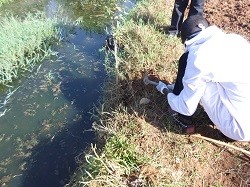New ideas about water management
The EU-funded SWAN (Sustainable water action: Building research links between EU and US) project was established to foster collaboration with the United States in the field of water management. Project partners promoted multidisciplinary collaboration to define new paradigms in the field of water management, and to build a common frame of analysis. Work was structured around three main themes: climate change and uncertainty; risks and vulnerabilities; and water demand and sustainability. The establishment of a case study in Tucson, Arizona in the United States allowed students from partner countries to conduct collaborative interdisciplinary research on water issues with local stakeholders. This research data was then made available to the public. SWAN also implemented the Global Climate Monitor(opens in new window), which is supported in the design of a data model. It serves as a tool to geo-visualize global climate data and climate-environmental indicators that explain weather patterns on a global scale to any potential user, within or outside the scientific community. The spatial data results from the book ‘Water Bankruptcy in the Land of Plenty: Steps towards a Transatlantic and Transdisciplinary Assessment of Water Scarcity in Southern Arizona’ were presented in a web-based data viewer. The tool is the result of collaborative work between different research teams and can be found online here(opens in new window). Open access to data is very important as the solution to environmental problems often requires data exchange at the local, national and/or international level. The benefits of the SWAN project include promotion of a new model for scientific work, involving a range of national partners and disciplines that integrated into a collaborative research process. This process implemented effective research practices in specific case studies, involving natural and social sciences and both academia and the public for the proposed Institute for Open Knowledge on Water.







